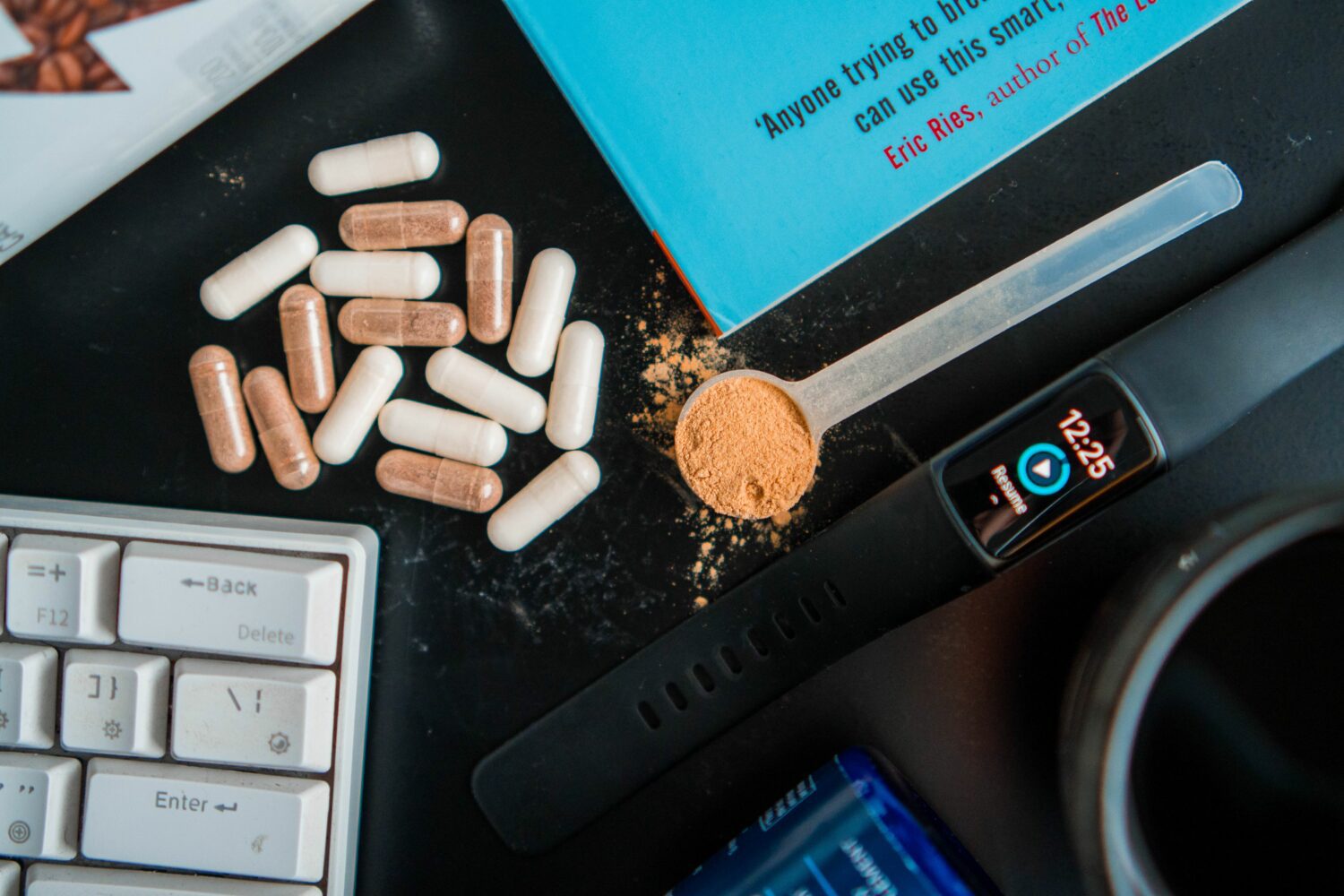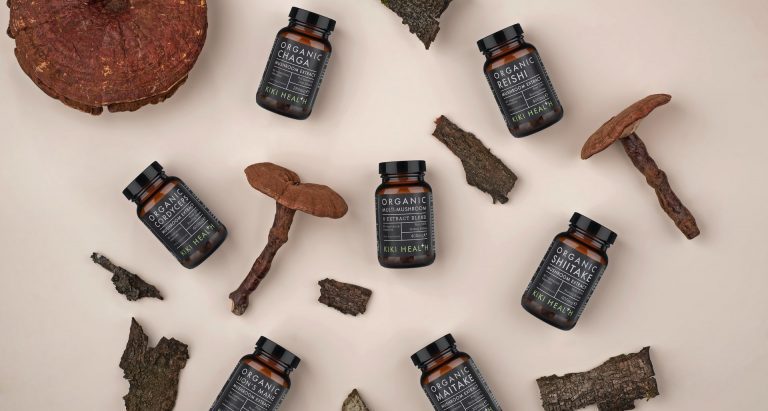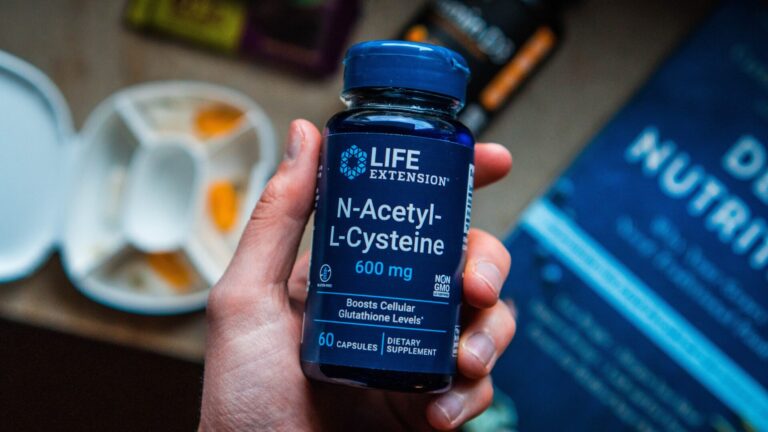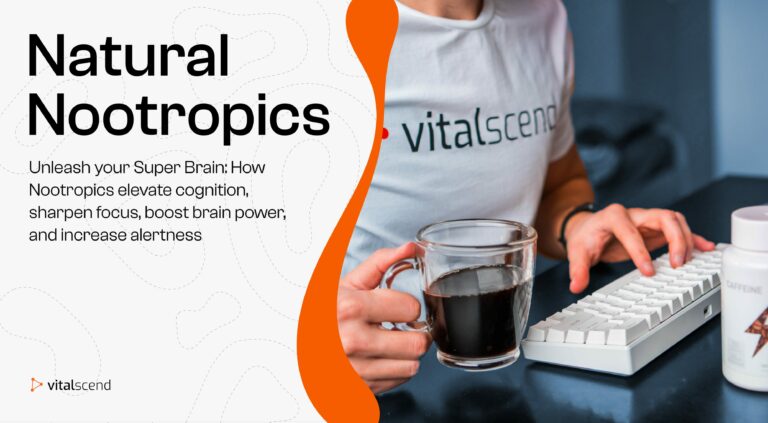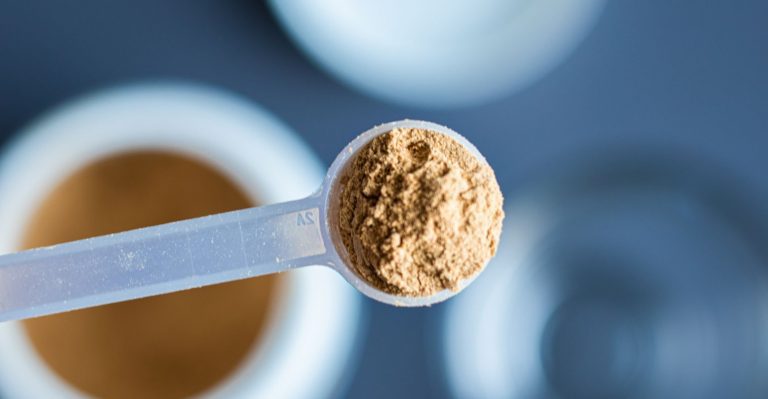Top 14 Natural Cognitive Enhancers List
Nootropics or cognitive enhancers are specific foods, supplements, or bioactive compounds that support brain health and improve cognition. We’ll check out the top 14 natural cognitive enhancers list, some of which may come as a surprise to you.
Don’t expect to see smart drugs on this list, but rather adaptogens, neurominerals, vitamins, and different nootropic mushrooms. Each of the 14 enhancers will have its top 3 superpowers listed below its name for easier navigation.
The Benefits of Natural Cognitive Enhancers
The benefits of nootropics can be due to excitatory activity, promoting activation of the brain, like increasing focus, alertness, and concentration. This is where caffeine punches in. Or, they can be inhibitory, like the effects of different teas and herbs that can stimulate GABA in the brain, promote relaxation, and enhance sleep. (1) (2)
There are also numerous amino acids like Taurine, N-Acetylcysteine, ALCAR, and Lipoic Acid which may surprise you. Their benefits rely on optimizing cellular metabolism, mitochondrial function, and utilization of glucose in the brain, supporting neural repair and maintenance. (3) (4)
Finally, there are many medicinal mushrooms and fungi, like Cordyceps, Lions Mane, and Chaga, which may provide immuno-stimulatory effects and exert neuroprotective effects. Plus, by increasing NGF and BDNF, they may support neuroplasticity and neurogenesis. (5)
Top 14 Natural Cognitive Enhancers
It goes without saying that there are numerous other nootropics that can have significant effects on the brain and improve cognition but unfortunately didn’t make the list. These are our favorite, practical and well-researched nootropics.
Honorable mentions include St. Johns Wort, Eleuthero, Yerba Mate, Magnesium Trace Minerals, B-Complex, Valerian Root, Cacao, Maca Root, Choline, Kava Kava, and N-Acetyl Cysteine.
Get your cup of coffee or tea, sprinkle some L-theanine in, sit down, and enjoy!
Are nootropics good for anxiety?
Many adaptogens like Rhodiola Rosea and Ashwagandha can help the body adapt to stressors and release anxiety. One anxiolytic component is the amino acid L-theanine which calms the brain and increases alertness.
What nootropics increase dopamine?
Nootropics like L-tyrosine and phenylalanine are known to increase or support dopamine levels. Another popular one is Mucuna Pruriens, the beans rich in L-dopa, a precursor to dopamine. Increased dopamine means greater mood, accompanied by feelings of happiness, satisfaction, and motivation.
What nootropic is best for memory?
Memory is a complex process that combines processing information, storing it, organizing it, and then retrieving it. The top Memory-boosting nootropics are Bacopa Monnieri, Omega 3’s, Ginkgo Biloba, and Alpha-GPC.
Which nootropics increase focus?
Focus is a multifaceted process and individual nootropics can only improve certain aspects of focus, such as attention or alertness, or attention span. The main effective focus boosters we know of include caffeine, L-theanine, and tyrosine.
Coffee / Caffeine – focus, processing, sharpness, fast thinking
Coffee is by far the most frequently used cognitive booster. It is a potent central nervous system stimulant, promoting a focused and alert, state. In simple terms, makes our brains sharper. It’s especially beneficial in suboptimal situations (being tired, poor sleep, etc.)
As we create more energy during the day, more Adenosine binds to the Adenosine receptors, signaling fatigue. Caffeine works by blocking these adenosine receptors. Yes, Even at low to moderate doses of 40 to 300 milligrams it improves attention, alertness, reaction, and vigilance. Good job caffeine! (1)
The nootropic effect of caffeine extends far beyond just improving focus. It can improve short-term, long-term memory, and increase processing speed – making your brain sharper. All in all, it’s a potent stimulant. (8)

Lions Mane Mushroom – Neuroplasticity, Neuroprotection, Brain Repair
Keeping our brain young and vital is essential for improving brain performance and slowing down cognitive decline. It’s about making the brain more adaptable or plastic to change, it’s how we learn, memorize and keep our brain active.
Lions Mane mushroom has numerous potent neurotropic effects on the brain. It contains two powerful bioactive compounds hericenones and erinacines that support (NGF) Nerve Growth Factor synthesis. This is important in brain repair and maintenance, as NGF supports neurogenesis or neural regeneration. (9) (10)
Lions Mane mushroom also exerts certain BDNF-like effects, as shown in vitro and in vivo. If you are confused, don’t worry – BDNF stands for brain-derived neurotropic factor, which helps with neuroplasticity. It keeps your brain healthy and young by improving its adaptability, thus supporting learning. (11)
Fun Fact
Lions Mane is an interesting nootropic mushroom, with a unique look. Really, google it. It looks like an inverted bowl of white pasta but does wonders for the brain.
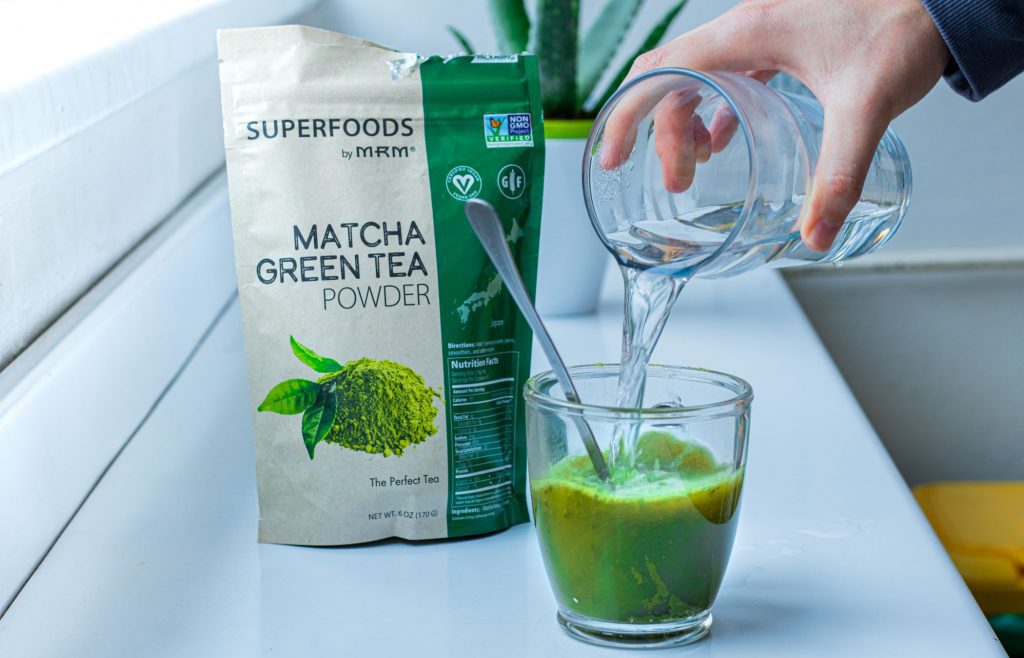
Matcha / L-theanine – alertness, learning, sleeping
Matcha tea is a strong, green tea that usually comes in a powder form, made by grinding its dry leaves. What’s unique about it is you drink the matcha powder in the tea itself. It’s also one of the most potent sources of L-theanine, which gets your brain into a state known as relaxed alertness.
Fun Fact
Theanine is known to increase the brain’s activity in the alpha wave band, which is a frequency between 8-12 Hz, in which you’re calm and alert. (12) It doesn’t make you drowsy like a sedative can, but calms you down. You can now meditate, sleep and learn better. If you ask me, it’s a winner.
- In 30 healthy individuals, administration of L-theanine just for 4 weeks, at 200 milligrams daily lead to better verbal fluency, letter fluency, and executive function. (13)
The buildup of glutamate in the brain leads to a hyperactivated state, which benefits no one. L-theanine can both block glutamate accumulation in the brain, plus increase levels of the happy chemicals like dopamine, serotonin, and GABA. If you understand the physiology of sleep, this is a game changer. (14)
Bacopa Monnieri – Memory and Learning
Bacopa Monnieri is a nootropic herb, with a long history of traditional use for longevity and cognition. It’s a white flowery thing, known by the name of Brahmi in Ayurveda. Brahmi means energy, and it’s commonly used for plants that enhance it, such as Gotu Kola or Bacopa.
Fun Fact
Bacopa Monnier’s main superpower is enhancing memory and learning, which are interconnected processes. It also exerts neuroprotective effects and improves signaling in the brain. But what dominates? Memory.
- At 300 milligrams daily for six weeks, bacopa extract produced potent effects on acetylcholine, calcium channels, and serum levels of calcium. These are the main underlying mechanisms, behind its effects. (15)
- In another 12-week trial, bacopa improved working memory, attention, and cognitive processing. Guess how. It works by suppressing the enzyme that breaks down acetylcholine, so we have more of it – which is nice, since it plays a massive role in neural signaling, learning, and cognition. (16)
Another study split 48 people into a Bacopa, and a placebo group. Those having bacopa improved word recall memory, were better at ignoring irrelevant info (focus), and the scores for depression dropper. (17)
Citicoline Alpha GPC – Memory, Cognition, Learning, Focus
Alpha GPC is quite a new and popular supplement for brain health. It’s actually a phospholipid with choline. Choline acts as a precursor to acetylcholine, an important agent in memory, attention, and cognition. Makes your brain run tasks smoothly.
Fun Fact
Many choline supplements aren’t as effective at increasing choline. Alpha-GPC was even more effective than Citicoline in raising plasma choline levels, which is important if the main benefit depends on acetylcholine levels. (18)
Alpha-GPC can enhance our ability to learn, memorize and perform cognitive tasks by modulating acetylcholine levels. (19) In people with mild cognitive impairment, it lead to better results in many tests (assessments) related to cognitive functioning. (20)
Citicoline is also known as CDP-Choline. It works on the same mechanism as Alpha-GPC. Once digested it’s separated into cytidine and choline. It helps with acetylcholine synthesis.
Research on citicoline shows potent effects in improving vigilance, psychomotor speed, arousal, and even reducing oxidative stress. (21) In women, at 250 or 500 mg it was effective in improving their attention and reducing attentional deficits. (22)
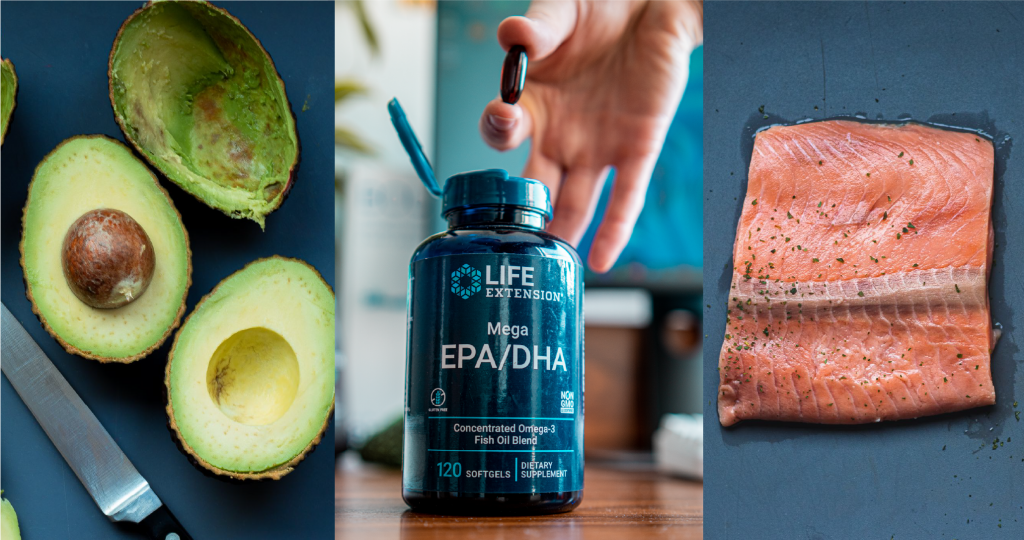
Omega 3 – Neural Integrity, Inflammation, Memory
Omega 3’s, especially DHA and EPA are essential nutrients for brain integrity, structure, and health. They support cognitive function, memory and may act neuroprotective. Eat your fish, avocados, and flax seeds guys!
DHA can affect many signaling pathways in the brain that help improve and maintain cognition. It acts on certain enzymes, signaling dynamics, and even membrane structures in the brain that enhance its development and function. (23)
Omega 3’s are also quite important for supporting memory function, and potentially slowing down cognitive decline. (24) Low levels of DHA are known to detrimentally affect the brain. From reduced brain efficiency, altered processes to emotional disturbance and weaker memory. (25)
Ginkgo Biloba – Memory, Hearing, Processing
Ginkgo is probably the most popular ancient Chinese tree, used for its potent medicinal properties. It’s usually supplemented in an extract form, with a high concentration of the powerful bioactive compounds it contains. It has been used for inflammation, hearing, cognition, mood, heart, and eye health.
Here’s what research has found:
- 14 days of Ginkgo extract supplementation lead to better behavioral performance, plus it may improve the brain’s processing efficiency. (26)
- It was effective in improving memory recall, recognition, and the ability to recall spoken words or auditory-verbal working memory in 262 elderly subjects. (27)
- The terpenoids in Ginkgo, like ginkgolides A, B and C can exert anxiolytic effects in mice. (28)
- In 136 elderly patients, Ginkgo had a potent anti-depressant-like effect, plus improved neurological function. (29)
Rhodiola Rosea – Mood, Stress and Fatigue
Rhodiola works as a real adaptogen. It’s a yellowish, flowering herb also known as golden root which mainly grows in Europe. It alters different pathways and hormones to help your body build resilience and fight stressors. You become more adaptable, less fatigued, and more energetic.
An extract of Rhodiola, called SHR-5 showed an increase in mental performance and concentration. It also reduced an important stress hormone that can lead to mental fatigue and burnout, you guessed it – Cortisol. (30)
The same extract supplemented for 20 days in students resulted in better neuro-motoric performance. Benefits extend beyond cognition, as it reduced mental fatigue and improved overall well-being. (31)
ALCAR – Focus, Processing, Energy, Motivation
Acetyl-L-Carnitine is an already synthesized form of L-Carnitine, important for blood flow. The power of ALCAR lies in its ability to cross the (BBB) blood-brain barrier, thus bringing more carnitine in. This increases energy production leading to a higher ATP output and optimizes mitochondria function.
The mechanism behind ALCAR’s nootropic effect include: (4)
- enhancing signaling in the brain – synaptic functioning
- restoring cell membranes – brain repair and maintenance
- supporting cholinergic activity and acetylcholine levels
- protecting the brain – anti-inflammatory, antioxidant
- improving brain’s efficiency – better mitochondria function
- Long-term studies (1 year, 130 patients) show Acetyl-L-Carnitine is quite effective in improving statistical scores for verbal critical abilities, long-term verbal memory, selective attention, and logical intelligence. (32)
- Comparing 1 gram of ALCAR vs. 100 milligrams of amantadine, a drug specifically made for chronic fatigue syndrome -ALCAR was more effective in reducing fatigue (in multiple sclerosis) and better tolerated. (33)
Fun Fact
So ALCAR works on a more fundamental level, focused on brain repair, maintenance, and brain metabolism. Yes, metabolism. It improves how efficient our brain is in utilizing fuel to generate more energy. This is extremely important as most cognitive decline and neurodegeneration develop due to metabolic deficits.
Pine Bark Extract – Brain Repair, Maintenance, Learning
Pine bark extract is a very potent neurotropic used in the Mediterranean region. It’s extracted from the French maritime pine bark, mainly used as an extract, rich in phenolic compounds like catechins and procyanidins.
Most of the research in Pine bark extract uses pycnogenol, which is an extract that contains 75% procyanidins. Here’s what studies have found:
- In 101 participants aged over 60, 150 milligrams of pycnogenol for 3 months improved memory variables, lipid peroxidation, and even working memory. (34)
- In 30 professionals, 12 weeks of Pycnogenol improved cognition, attention (sustained), memory, executive function, and overall mood and mental performance. (35)
Pine bark extract has potent antioxidant-like functions due to its bioactive compounds – catechins, procyanidins, and phenolic compounds. This can exert neuroprotective properties, protecting the brain from oxidative damage.
Mucuna Pruriens – Mood, L-Dopa, Anxiety, Stress
When it comes to improving mood, there are many precursors to dopamine and serotonin that may help. These mainly work by enhancing the levels of such neurotransmitters in the brain.
Mucuna can mediate and stimulate dopaminergic activity, which can have an antidepressant-like effect. (36)
It’s also shown to be a potent neuroprotective agent due to the high antioxidant activity of L-dopa. It has also been used for certain neurodegenerative diseases like Parkinson’s disease. (37) (38)
Fun Fact
Mucuna pruriens is a velvet bean – a tropical legume found in Africa and Asia. The reason why it’s so powerful lies in the high concentration of L-Dopa. Levodopa is then used for the biosynthesis of tyrosine, another amino acid of great importance for mood, as it is a precursor to dopamine. See the chain of events that occur?
GABA – Sleep, Relaxation, Serotonin, Melatonin
One of the most interesting long-named amino acids that acts as an inhibitor, is GABA. Gamma-aminobutyric acid is a well-known supplement in the “sleeping industry” It’s the chief operator of inhibition, which reduces the excitability of your nervous system. (39)
In combination with L-theanine, GABA is shown to reduce anxiety and induce relaxation, thus helping improve the duration and quality of sleep. (2)
Another systematic review has shown GABA’s effectiveness in: (40)
- reducing time to fall asleep – at 100-300 mg daily, for 1-4 weeks
- reducing sleep latency as well – supplemented 1h prior to bed
- increase total non-REM sleep – supplemented 30 min prior to sleep
Foods high in GABA include spinach, mushrooms, broccoli, brussels sprouts, sweet potatoes, brown rice and soy.
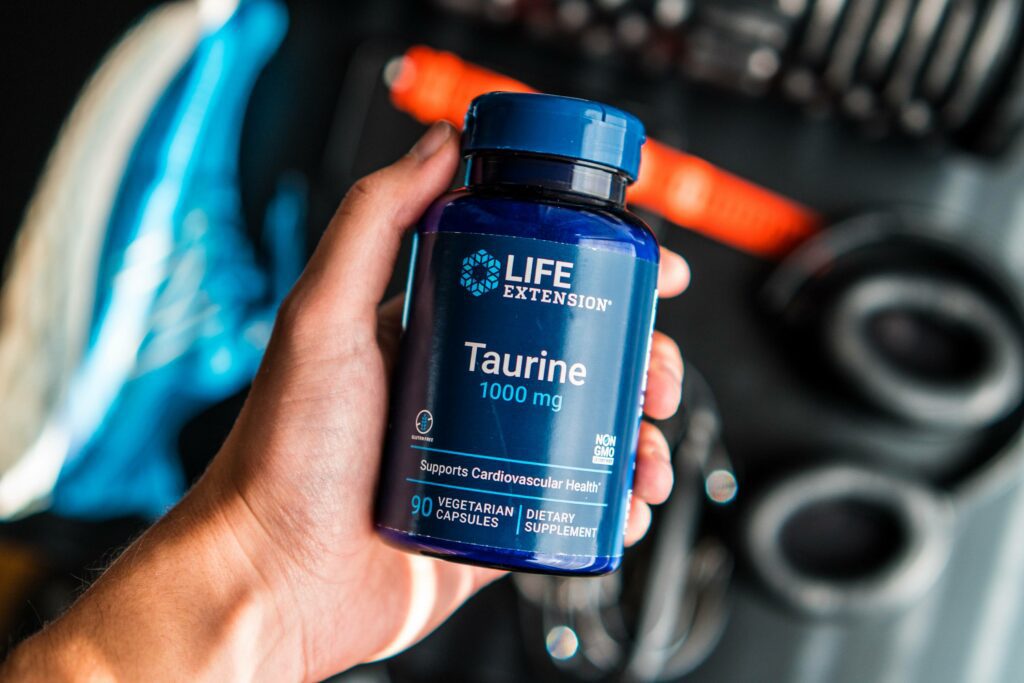
ALA and Taurine – Muscle, Heart Health, Energy
ALA and Taurine are interesting amino acids that work on a similar mechanism. Instead of being focused on anabolism and muscle-growth, they work with energy production on a cellular level. ALA and Taurine support brain metabolism by optimizing mitochondrial function and improving glucose utilization.
Taurine is present in large amounts in the free amino acid pool in the central nervous system. It’s mainly found in excitatory tissue, meaning the brain and the heart. It mainly works on the mitochondria, thus showing a potential to help with metabolic health, energy, and even cardiovascular and neurological health. (3)
It has shown potential in mediating inflammation, acting as an antioxidant. Plus, it supports all these metabolic-brain things like generating more mitochondria, enhancing synaptic function (plasticity), and generating ATP. (41)
ALA is alpha lipoic acid, which also helps with the efficient use of fuel.
- At 600 milligrams daily, it improved scores for cognitive function for 43% in those with Alzheimer’s and diabetes, and 23% in those with just AD. (42)
- In Wistar rats, it improved glycemic control and synaptic plasticity at doses between 50 to 200 mg/kg. (43)
- Lipoic acid has also been shown to improve memory and memory deficits in people with age-related cognitive decline. It may also act neuroprotective, as it increases levels of glutathione, vitamin C, and E – other potent antioxidants. (44)
Cordyceps – Immunity, Energy, Libido
Cordyceps is a fungus with potent medicinal properties. It’s known to increase energy, immunity, nourish the kidneys, and even help increase libido. The two main forms studied are Cordyceps sinesis and Cordyceps militaris.
Fun Fact
Cordyceps contains a very powerful compound known as cordycepin, which may be responsible for many of its neuroprotective effects.
It’s known to improve exercise performance, as research in mouse models shows it reduced mental fatigue, increased energy, and improved markers of physical fatigue like lactate accumulation, creatine kinase, urea nitrogen, etc. (5)
- In terms of cognition, also tested on animal models Cordyceps (polypeptide or extracts) showed:
improvement of both memory and learning, reduction of oxidative damage, and neuroprotective properties. (45) - C.militaris improved memory induced by scopolamine, or ischemia in Wistar rats – showing its potential to exert neuroprotective and antioxidant-like effects. (46)
- Cordycepin, the powerful component of cordyceps may help reduce inflammation, thus acting neuroprotective. (47)
Conclusion
Here are some of the best natural nootropics for each specific cognitive skill or area related to brain health.
- Focus, Alertness, Processing – Caffeine, L-theanine, Creatine, Choline, Alpha-GPC
- Learning, Memory, Neuroplasticity – Bacopa Monnieri, Lions Mane, Alpha-GPC
- Brain Repair, Maintenance – Pine Bark Extract, Ginkgo Biloba, Omega 3’s (DHA),
- Brain Energy, Metabolism – ALCAR, N-Acetyl Cysteine, Taurine, Alpha Lipoic Acid, Rhodiola Rosea
- Immunity, Neuroprotection – Cordyceps, Lions Mane, DHA, Lipoic Acid, Ginkgo Biloba
- Mood, Sleep, Stress, Relaxation – L-theanine, GABA, Mucuna Pruriens, Rhodiola Rosea

